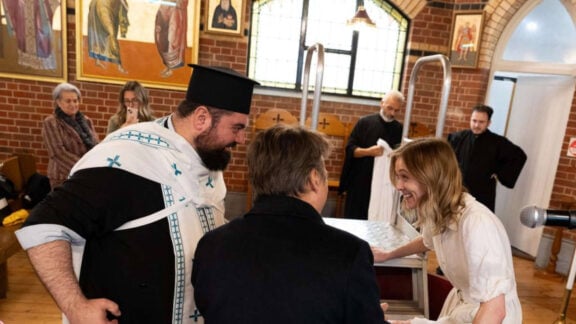* It’s hard to imagine it now, but two years ago, people in Athens were frantically dancing to Algerian rocker Rachid Taha’s cover of the Clash’s classic song ‘Rock the Casbah’, celebrating the victory of the left-wing SYRIZA party at the elections. It might have seemed as an unlikely song to echo at such an event, but then, SYRIZA’s ascension to power had been deemed as unlikely a few years before. In fact, this song perfectly encapsulates the party’s esthetics, with its combination of punk-rock sensitivity and oriental overtones, underlying how Greece stands in the crossroads of civilisations and how once underground elements (be it leftist rhetoric or punk-rock) are now absolutely mainstream and unthreatening. It was also an interesting way for the party to express its pledge to shake the establishment, demanding from the European bureaucracy to treat Greece with more fairness.
* SYRIZA did ‘rock the casbah’, at least for a period of six months, during the well-documented ‘negotiations’ which all but led to the complete collapse of Greece’s economy (not that there had been much left to collapse, after five years of dead-end austerity); then he promptly began ‘un-rocking’ it, and transforming itself from a ‘mainstream-ised version of a leftist threat’ to a regular governing party. In fact, the Tsipras government has not only proved to be the most obedient follower of the country’s creditors’ orders, effectively imposing measures that no other government would have dared to, but it is now looking as any other centre-right government in Greece (and in some other countries).
* International media – and the opposition in Greece – continue to refer to SYRIZA as ‘leftists’, but this is far from the truth. In fact, taking out a few references to Cuba and some mild civil-war rhetoric restrained to parliamentary catfights, there has been nothing leftist or marxist in the governments’ talk or actions. By comparison, when Andreas Papandreou rose to power in 1981, everyone in his PASOK government make sure to remind to people that the marxists had taken over.
* Which is why ‘Rock the Casbah’ now seems ironic. The SYRIZA government celebrated two years in power, its cheers buried under the noise of the voices calling for Tsipras to step down – voices coming both from the betrayed left and the indignant right, which still can’t stand the fact that they are made to stand aside and see another party (reluctantly) impose the policies they (wholeheartedly) embrace. For the past 18 months, the Syriza government, has been reinforcing the symbolic casbahs, both the one built by the european elites, and the one Tsipras and his posse live in.
* Looking back to the party’s two years in power, a left-leaning, progressive voter has not much to celebrate, but for two pieces of legislation: the one that on civil union pacts, acknowledging the de facto relationships of same-sex couples in Greece and the one that automatically grants citizenship to children of migrants born in Greece.
* In an ironic turn of events, it was such children, born in Greece by long-assimilated migrants, which created another headache for the government, muffling its celebrations in another wave of cries of indignation. This happened when the 24/7 news cycle that is now being dominated by social media was overcome by the image of a group of young Greek-Albanian soldiers, photographed in the military camp where they undergo their mandatory basic training, making the sign of the two-headed eagle with their hands. Which some saw as an insult to their country.
* People of two nationalities – such as Greek-Australians – should be able to relate to the idea of a group of people using their shared cultural identity as a means to relate and navigate within a hard environment and the whole thing should have been a non-issue, if it had taken place in a normal country. But Greece is not a normal country. The Defense Minister himself (who is of course, the deputy head of government and the leader of the right-wing ‘Independent Greeks’ party which forms the strange government coalition), Panos Kammenos, pledged to punish the young men, among the noise of people echoing the ages-old dilemma: “whose side will these men choose, in the case of war between Greece and Albania”?
* Of course, the likelihood of such a war occurring is pretty much the same as a war with Switzerland or Mars. The two countries have avoided conflict during worse periods in history, most notably when the dissolution of Yugoslavia turned the Balkans into war territory, and there is no reason to think that any such danger ensues now. Despite the fears – and moronic impulses – of some, Greece is not threatened by any of its neighbours, not even Turkey. In fact, the only time it risked entering conflict was when another Defense minister, Gerasimos Arsenis, fell victim of the news cycle, the irresponsible media and hot-headed nationalists and sent the navy to engage in conflict at the Imia, resulting to the avoidable tragic loss of Greek soldiers’ lives.
* This is something that we should remember, given that there’s again some friction between the countries. Of course, Recep Tayip Erdogan has a lot on his plate at the moment, and tension with Greece is a luxury he cannot afford, but it is certain that he is not happy with the Greek Supreme Court’s decision to reject the extradition of eight Turkish soldiers who sought political asylum in the country after the failed July 2016 coup attempt. The officers – two commanders, four captains and two sergeants – had previously stated that their life would be in jeopardy once extradited. They were imprisoned for illegal entry in Greece, but the court ordered for their release from custody.
* It was a small victory, for human rights, mostly. But it also allowed for Greeks to take pride in standing up against the autocratic regime in Turkey. It felt good. Which is not something one often says when thinking of government actions.








